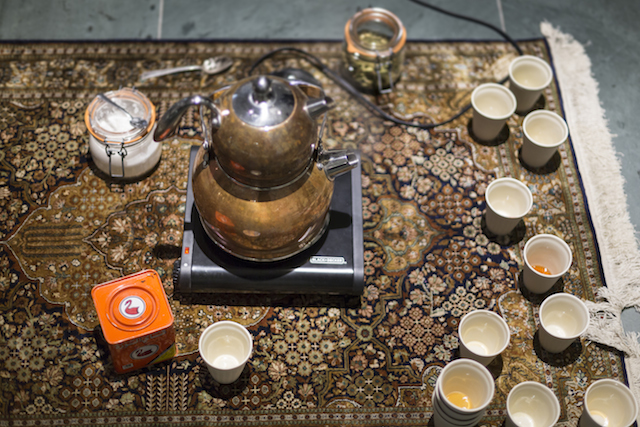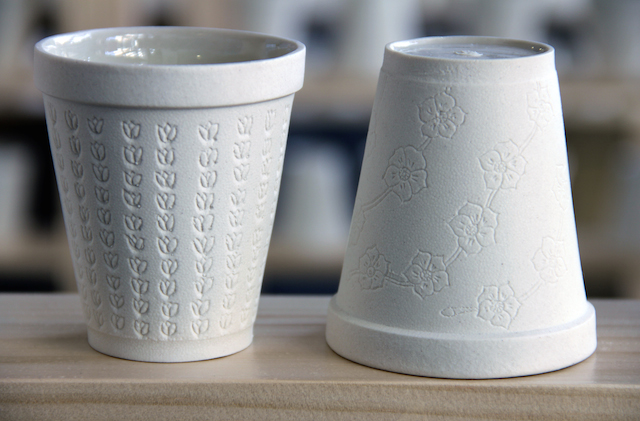Interactive Show Serves Up Tea And Iraq War Stories At Links Hall
By Chicagoist_Guest in Arts & Entertainment on Mar 28, 2016 3:00PM
Photo courtesy of Aaron Hughes and Amber Ginsburg of the Tea Project
By Nathalie Lagerfeld
At the end of each day of Aaron Hughes’ missions in Iraq, the migrant laborers at his military post—an international group, originally from countries ranging from Sri Lanka to Pakistan—would always perform the same ritual. They’d roll out a rug, take out a hot plate and tea kettle and start to prepare tea—tea that “was always generously offered” to whichever soldiers happened to be around, Hughes told Chicagoist.
When Hughes returned from the Iraq War disillusioned—he’s an active member of Iraq Veterans Against the War—his memory of peacefully drinking tea with the migrant workers survived. That glimmer of humanity and hope during wartime became the genesis of the Tea Project, a series of installations and events that aim to open a dialogue around the War on Terror. Hughes and his collaborator Amber Ginsburg will bring the latest round to Links Hall from March 31 to April 16.
The Tea Project will host two types of events in Chicago, united by, well, tea. At one of them, Tea Performances, Hughes shares tales of his own experiences in Iraq to spur a conversation with the audience. The other, Tea Engagements, is a cabaret-style show that bring together speakers from diverse disciplines to address human rights topics.
At Tea Engagements, hosts serve teas from the home countries of Guantanamo detainees, like Pakistani milk tea. The rotating lineup for the Links Hall Tea Engagements will include lawyers from The Center for Constitutional Rights, the editor of the New York Times bestseller Guantanamo Diary, and peace activist Kathy Kelly of Voices for Creative Nonviolence. The series also includes one performance of playwright Rohina Malik’s piece Unveiled, a one-woman show about the lives of five Muslim women, on April 4.
“We felt it was important for us both to engage in the Tea Project, but also to offer this performance opportunity to other voices,”said Ginsburg, an artist and lecturer in Visual Arts at the University of Chicago. “Especially other voices that might not be heard as commonly.”

Photo courtesy of Aaron Hughes and Amber Ginsburg of the Tea Project
The Tea Performances tend to get more personal for the artists and their audiences. As Hughes prepares piping-hot cups of Alwazah tea with cardamom at Tea Performances, he shares his own stories of the war, and invites audience members to share their memories, too. The goal is for them to interrogate their own complicity in the legacy of the Iraq War, including xenophobia, racism, Islamophobia, and violence. “It’s building an arc of these short stories I tell, and also building an arc of these people’s experiences,” Hughes said.
For those who are worried about sharing personal stories around such touchy subjects, have no fear; speaking up is not required. “If you say ‘expect to participate,’ that can really put people off,” said Ginsberg. While there is a certain performance tradition that breaks the third wall to put the audience on the spot, she added, that’s not really what the Tea Performances are about.

Photo courtesy of Aaron Hughes and Amber Ginsburg of the Tea Project
Instead, the sessions are more about contemplation. Moments of silence—even awkward ones—are accepted, even encouraged as part of the experience. “The piece would still happen if no one shared,” Hughes said. “When the dialogue dies down or goes off the rails, I just tell another story.” Once Hughes’ performance is done, participants are invited to stay and discuss their thoughts over tea—though this, too, is optional.
Like the tea itself, the cups in which the tea is served are an important part of the performance. Inspired by the story of a Guantanamo guard who fell in love with the intricate decorations detainees would carve into their styrofoam cups, Ginsburg and Hughes cast 779 cups in porcelain, each engraved with the name and nationality of one detainee. Ginsburg and Hughes are slowly returning cups to the detainees’ homelands: so far Hughes has taken 20 cups to Afghanistan and four to Turkey. “We don’t really feel like they belong to us,” Hughes said. They aim to eventually repatriate all 779 cups.
All Tea Performances and Tea Engagements at Links Hall (3111 N. Western Ave.) are free, but guests are encouraged to RSVP here.
Correction, March 29: Previously, the first sentence of this post read "At the end of each day of Aaron Hughes’ tour of duty in Iraq, the Iraqis at his Army camp would perform the same ritual." Really, Hughes went to Iraq on missions and was stationed at a military post; the people who performed the ritual were migrant workers from neither Iraq nor the US, not Iraqis.